Business Law Report: Analysis of K Company's Business Operations
VerifiedAdded on 2020/10/22
|11
|3246
|112
Report
AI Summary
This report analyzes the business law issues faced by K Company, a food service provider in West London. It begins with an introduction to the English Legal System, including its divisions, sources of law, and court structure. The report then examines the legal implications of K Company's employment practices, particularly the status of its couriers, drawing parallels with the Pimlico Plumber v. Smith case. It explores the impact of employment law and the gig economy on K Company's operations. The report further discusses different types of business organizations, specifically focusing on limited companies, and concludes with suggestions for resolving legal disputes with IT suppliers. The analysis covers employment contracts, legal responsibilities, and the importance of compliance with employment laws to ensure fair treatment of workers. The report emphasizes the need for K Company to adapt its practices to align with employment regulations and the principles of the gig economy, ensuring both legal compliance and ethical business operations.

BUSINESS LAW
Paraphrase This Document
Need a fresh take? Get an instant paraphrase of this document with our AI Paraphraser
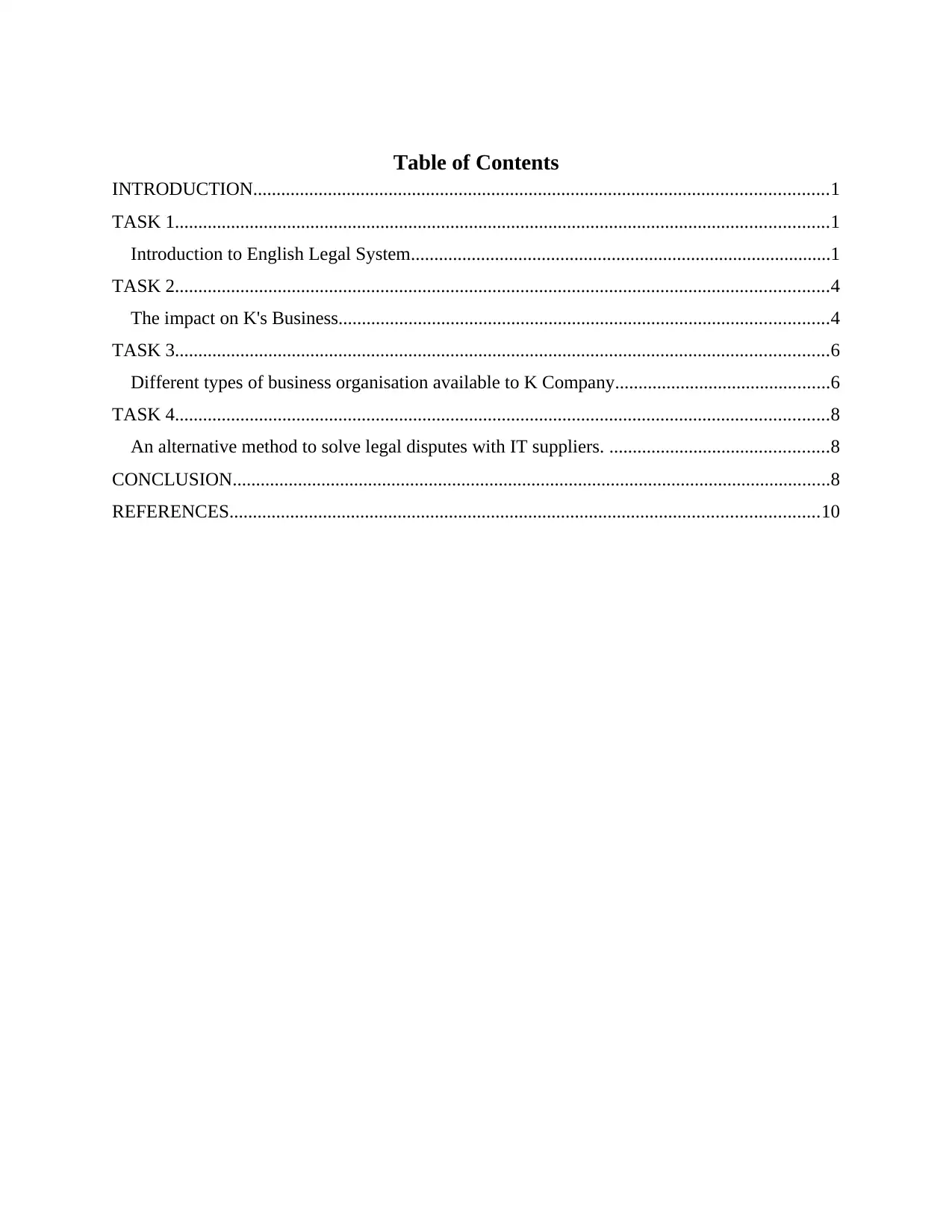
Table of Contents
INTRODUCTION...........................................................................................................................1
TASK 1............................................................................................................................................1
Introduction to English Legal System..........................................................................................1
TASK 2............................................................................................................................................4
The impact on K's Business.........................................................................................................4
TASK 3............................................................................................................................................6
Different types of business organisation available to K Company..............................................6
TASK 4............................................................................................................................................8
An alternative method to solve legal disputes with IT suppliers. ...............................................8
CONCLUSION................................................................................................................................8
REFERENCES..............................................................................................................................10
INTRODUCTION...........................................................................................................................1
TASK 1............................................................................................................................................1
Introduction to English Legal System..........................................................................................1
TASK 2............................................................................................................................................4
The impact on K's Business.........................................................................................................4
TASK 3............................................................................................................................................6
Different types of business organisation available to K Company..............................................6
TASK 4............................................................................................................................................8
An alternative method to solve legal disputes with IT suppliers. ...............................................8
CONCLUSION................................................................................................................................8
REFERENCES..............................................................................................................................10
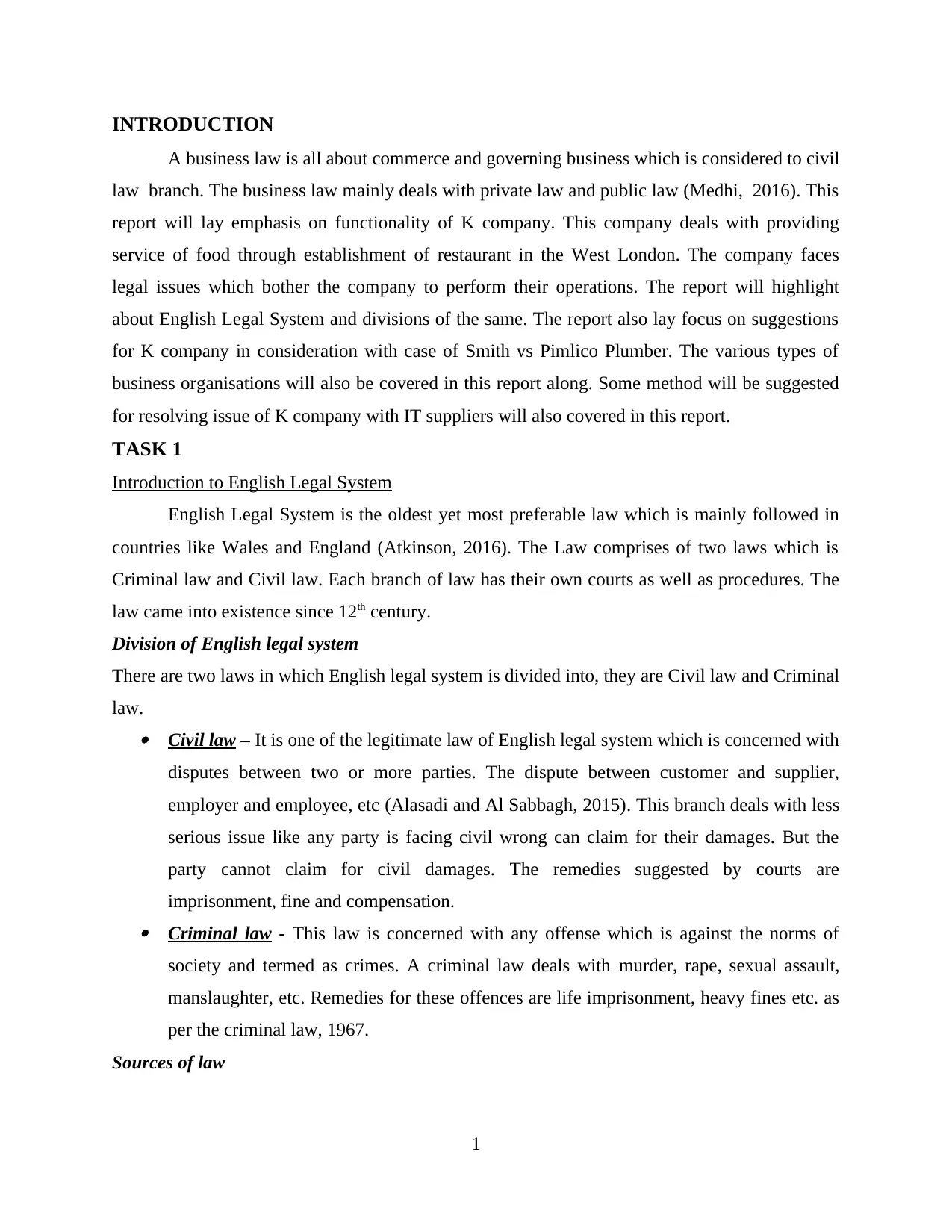
INTRODUCTION
A business law is all about commerce and governing business which is considered to civil
law branch. The business law mainly deals with private law and public law (Medhi, 2016). This
report will lay emphasis on functionality of K company. This company deals with providing
service of food through establishment of restaurant in the West London. The company faces
legal issues which bother the company to perform their operations. The report will highlight
about English Legal System and divisions of the same. The report also lay focus on suggestions
for K company in consideration with case of Smith vs Pimlico Plumber. The various types of
business organisations will also be covered in this report along. Some method will be suggested
for resolving issue of K company with IT suppliers will also covered in this report.
TASK 1
Introduction to English Legal System
English Legal System is the oldest yet most preferable law which is mainly followed in
countries like Wales and England (Atkinson, 2016). The Law comprises of two laws which is
Criminal law and Civil law. Each branch of law has their own courts as well as procedures. The
law came into existence since 12th century.
Division of English legal system
There are two laws in which English legal system is divided into, they are Civil law and Criminal
law. Civil law – It is one of the legitimate law of English legal system which is concerned with
disputes between two or more parties. The dispute between customer and supplier,
employer and employee, etc (Alasadi and Al Sabbagh, 2015). This branch deals with less
serious issue like any party is facing civil wrong can claim for their damages. But the
party cannot claim for civil damages. The remedies suggested by courts are
imprisonment, fine and compensation. Criminal law - This law is concerned with any offense which is against the norms of
society and termed as crimes. A criminal law deals with murder, rape, sexual assault,
manslaughter, etc. Remedies for these offences are life imprisonment, heavy fines etc. as
per the criminal law, 1967.
Sources of law
1
A business law is all about commerce and governing business which is considered to civil
law branch. The business law mainly deals with private law and public law (Medhi, 2016). This
report will lay emphasis on functionality of K company. This company deals with providing
service of food through establishment of restaurant in the West London. The company faces
legal issues which bother the company to perform their operations. The report will highlight
about English Legal System and divisions of the same. The report also lay focus on suggestions
for K company in consideration with case of Smith vs Pimlico Plumber. The various types of
business organisations will also be covered in this report along. Some method will be suggested
for resolving issue of K company with IT suppliers will also covered in this report.
TASK 1
Introduction to English Legal System
English Legal System is the oldest yet most preferable law which is mainly followed in
countries like Wales and England (Atkinson, 2016). The Law comprises of two laws which is
Criminal law and Civil law. Each branch of law has their own courts as well as procedures. The
law came into existence since 12th century.
Division of English legal system
There are two laws in which English legal system is divided into, they are Civil law and Criminal
law. Civil law – It is one of the legitimate law of English legal system which is concerned with
disputes between two or more parties. The dispute between customer and supplier,
employer and employee, etc (Alasadi and Al Sabbagh, 2015). This branch deals with less
serious issue like any party is facing civil wrong can claim for their damages. But the
party cannot claim for civil damages. The remedies suggested by courts are
imprisonment, fine and compensation. Criminal law - This law is concerned with any offense which is against the norms of
society and termed as crimes. A criminal law deals with murder, rape, sexual assault,
manslaughter, etc. Remedies for these offences are life imprisonment, heavy fines etc. as
per the criminal law, 1967.
Sources of law
1
⊘ This is a preview!⊘
Do you want full access?
Subscribe today to unlock all pages.

Trusted by 1+ million students worldwide
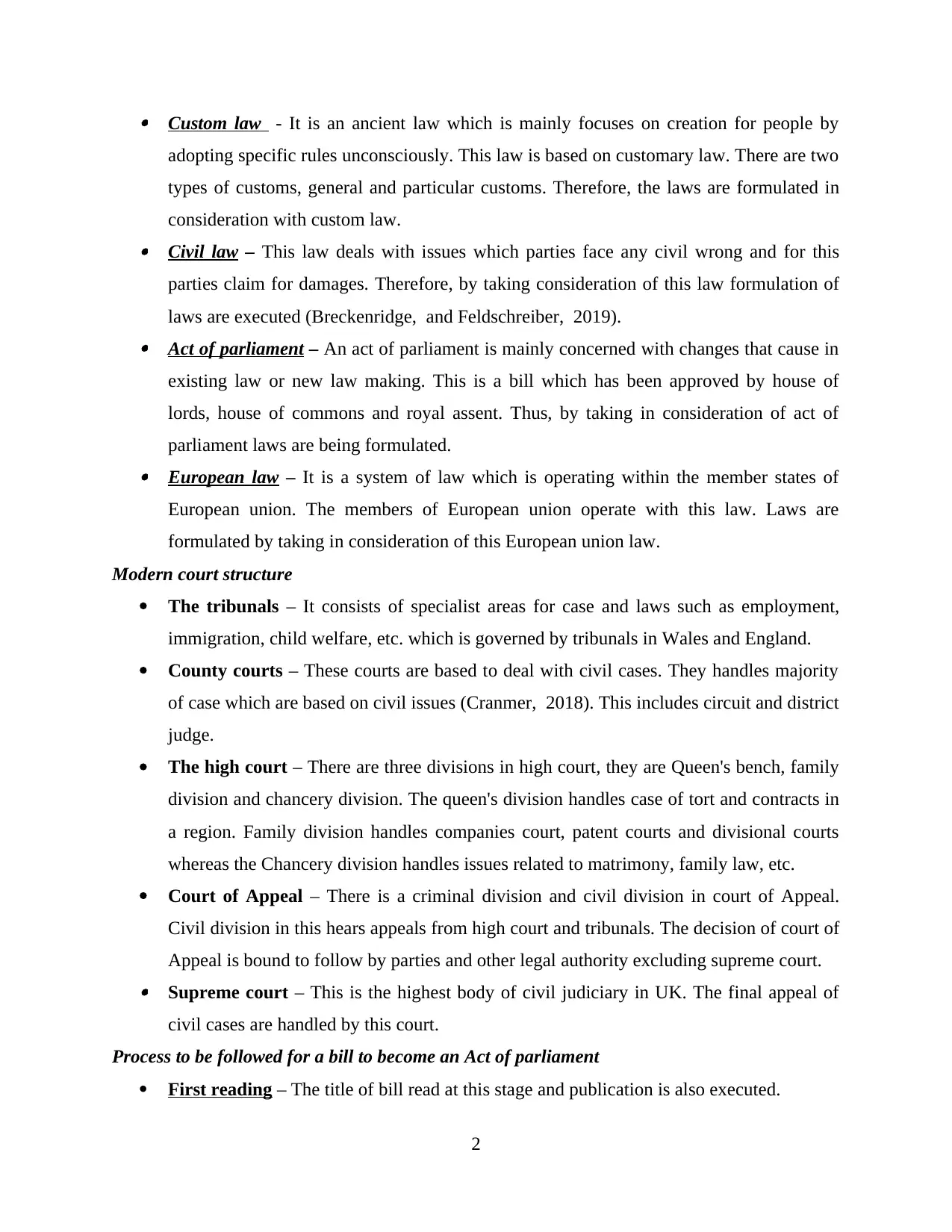
Custom law - It is an ancient law which is mainly focuses on creation for people by
adopting specific rules unconsciously. This law is based on customary law. There are two
types of customs, general and particular customs. Therefore, the laws are formulated in
consideration with custom law. Civil law – This law deals with issues which parties face any civil wrong and for this
parties claim for damages. Therefore, by taking consideration of this law formulation of
laws are executed (Breckenridge, and Feldschreiber, 2019). Act of parliament – An act of parliament is mainly concerned with changes that cause in
existing law or new law making. This is a bill which has been approved by house of
lords, house of commons and royal assent. Thus, by taking in consideration of act of
parliament laws are being formulated. European law – It is a system of law which is operating within the member states of
European union. The members of European union operate with this law. Laws are
formulated by taking in consideration of this European union law.
Modern court structure
The tribunals – It consists of specialist areas for case and laws such as employment,
immigration, child welfare, etc. which is governed by tribunals in Wales and England.
County courts – These courts are based to deal with civil cases. They handles majority
of case which are based on civil issues (Cranmer, 2018). This includes circuit and district
judge.
The high court – There are three divisions in high court, they are Queen's bench, family
division and chancery division. The queen's division handles case of tort and contracts in
a region. Family division handles companies court, patent courts and divisional courts
whereas the Chancery division handles issues related to matrimony, family law, etc.
Court of Appeal – There is a criminal division and civil division in court of Appeal.
Civil division in this hears appeals from high court and tribunals. The decision of court of
Appeal is bound to follow by parties and other legal authority excluding supreme court. Supreme court – This is the highest body of civil judiciary in UK. The final appeal of
civil cases are handled by this court.
Process to be followed for a bill to become an Act of parliament
First reading – The title of bill read at this stage and publication is also executed.
2
adopting specific rules unconsciously. This law is based on customary law. There are two
types of customs, general and particular customs. Therefore, the laws are formulated in
consideration with custom law. Civil law – This law deals with issues which parties face any civil wrong and for this
parties claim for damages. Therefore, by taking consideration of this law formulation of
laws are executed (Breckenridge, and Feldschreiber, 2019). Act of parliament – An act of parliament is mainly concerned with changes that cause in
existing law or new law making. This is a bill which has been approved by house of
lords, house of commons and royal assent. Thus, by taking in consideration of act of
parliament laws are being formulated. European law – It is a system of law which is operating within the member states of
European union. The members of European union operate with this law. Laws are
formulated by taking in consideration of this European union law.
Modern court structure
The tribunals – It consists of specialist areas for case and laws such as employment,
immigration, child welfare, etc. which is governed by tribunals in Wales and England.
County courts – These courts are based to deal with civil cases. They handles majority
of case which are based on civil issues (Cranmer, 2018). This includes circuit and district
judge.
The high court – There are three divisions in high court, they are Queen's bench, family
division and chancery division. The queen's division handles case of tort and contracts in
a region. Family division handles companies court, patent courts and divisional courts
whereas the Chancery division handles issues related to matrimony, family law, etc.
Court of Appeal – There is a criminal division and civil division in court of Appeal.
Civil division in this hears appeals from high court and tribunals. The decision of court of
Appeal is bound to follow by parties and other legal authority excluding supreme court. Supreme court – This is the highest body of civil judiciary in UK. The final appeal of
civil cases are handled by this court.
Process to be followed for a bill to become an Act of parliament
First reading – The title of bill read at this stage and publication is also executed.
2
Paraphrase This Document
Need a fresh take? Get an instant paraphrase of this document with our AI Paraphraser
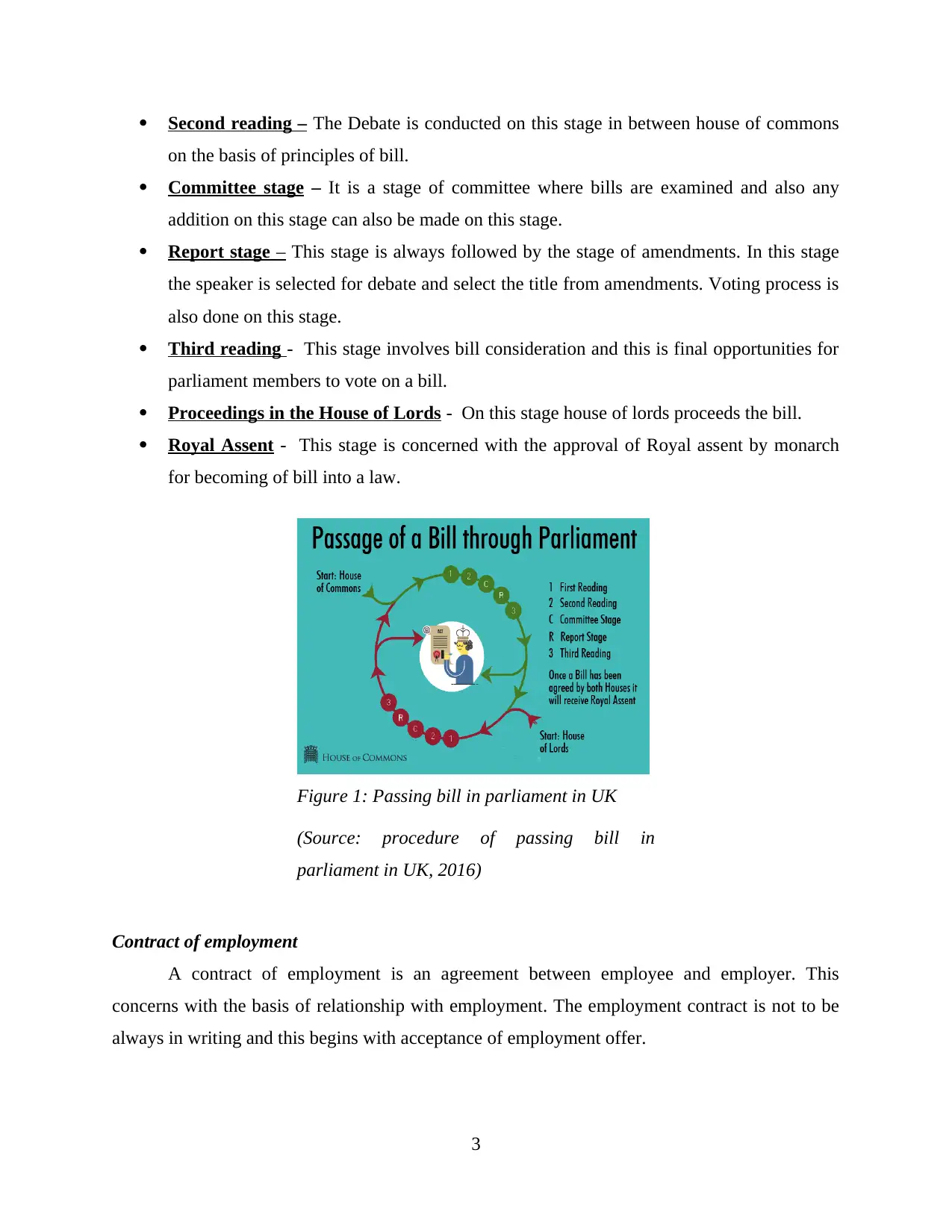
Second reading – The Debate is conducted on this stage in between house of commons
on the basis of principles of bill.
Committee stage – It is a stage of committee where bills are examined and also any
addition on this stage can also be made on this stage.
Report stage – This stage is always followed by the stage of amendments. In this stage
the speaker is selected for debate and select the title from amendments. Voting process is
also done on this stage.
Third reading - This stage involves bill consideration and this is final opportunities for
parliament members to vote on a bill.
Proceedings in the House of Lords - On this stage house of lords proceeds the bill.
Royal Assent - This stage is concerned with the approval of Royal assent by monarch
for becoming of bill into a law.
Contract of employment
A contract of employment is an agreement between employee and employer. This
concerns with the basis of relationship with employment. The employment contract is not to be
always in writing and this begins with acceptance of employment offer.
3
Figure 1: Passing bill in parliament in UK
(Source: procedure of passing bill in
parliament in UK, 2016)
on the basis of principles of bill.
Committee stage – It is a stage of committee where bills are examined and also any
addition on this stage can also be made on this stage.
Report stage – This stage is always followed by the stage of amendments. In this stage
the speaker is selected for debate and select the title from amendments. Voting process is
also done on this stage.
Third reading - This stage involves bill consideration and this is final opportunities for
parliament members to vote on a bill.
Proceedings in the House of Lords - On this stage house of lords proceeds the bill.
Royal Assent - This stage is concerned with the approval of Royal assent by monarch
for becoming of bill into a law.
Contract of employment
A contract of employment is an agreement between employee and employer. This
concerns with the basis of relationship with employment. The employment contract is not to be
always in writing and this begins with acceptance of employment offer.
3
Figure 1: Passing bill in parliament in UK
(Source: procedure of passing bill in
parliament in UK, 2016)
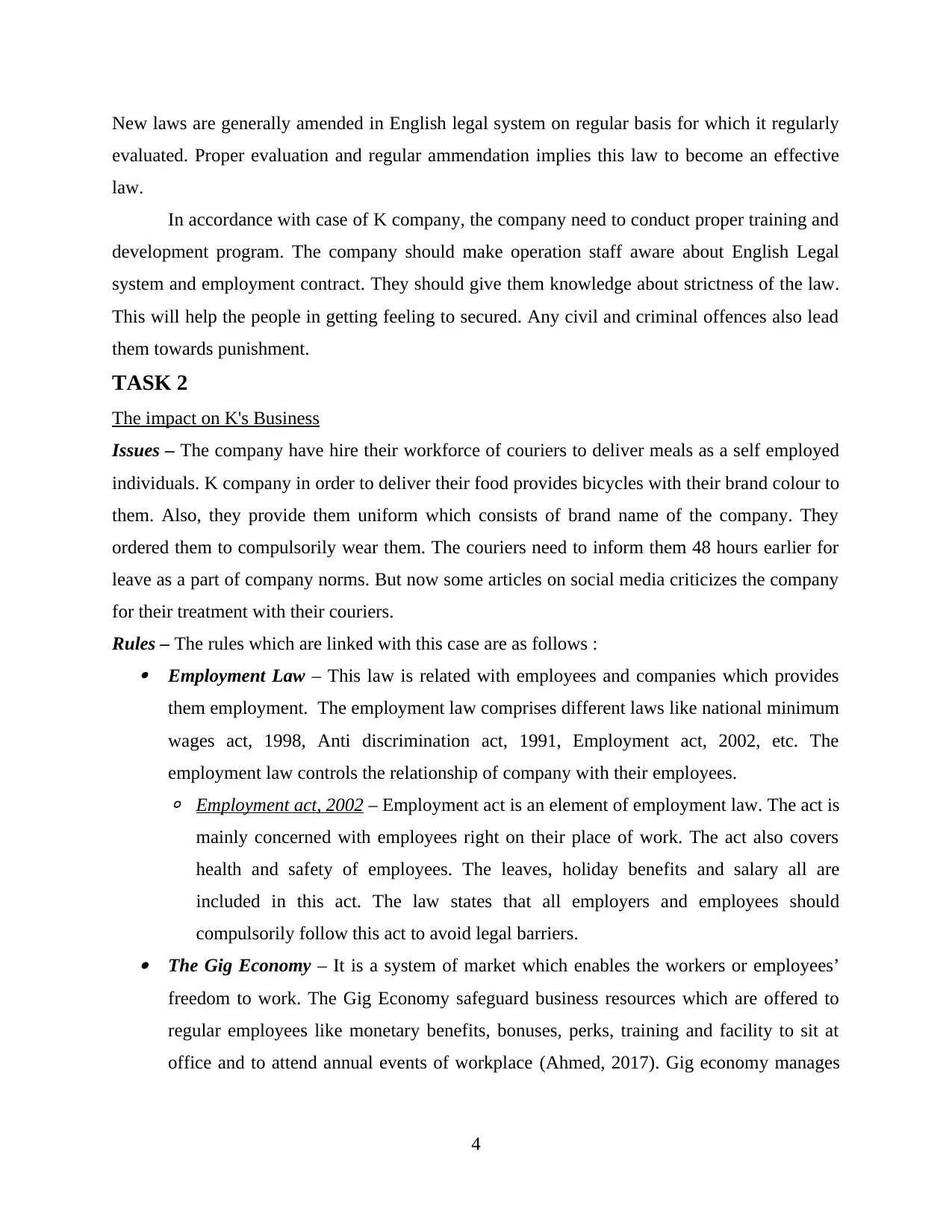
New laws are generally amended in English legal system on regular basis for which it regularly
evaluated. Proper evaluation and regular ammendation implies this law to become an effective
law.
In accordance with case of K company, the company need to conduct proper training and
development program. The company should make operation staff aware about English Legal
system and employment contract. They should give them knowledge about strictness of the law.
This will help the people in getting feeling to secured. Any civil and criminal offences also lead
them towards punishment.
TASK 2
The impact on K's Business
Issues – The company have hire their workforce of couriers to deliver meals as a self employed
individuals. K company in order to deliver their food provides bicycles with their brand colour to
them. Also, they provide them uniform which consists of brand name of the company. They
ordered them to compulsorily wear them. The couriers need to inform them 48 hours earlier for
leave as a part of company norms. But now some articles on social media criticizes the company
for their treatment with their couriers.
Rules – The rules which are linked with this case are as follows : Employment Law – This law is related with employees and companies which provides
them employment. The employment law comprises different laws like national minimum
wages act, 1998, Anti discrimination act, 1991, Employment act, 2002, etc. The
employment law controls the relationship of company with their employees.
◦ Employment act, 2002 – Employment act is an element of employment law. The act is
mainly concerned with employees right on their place of work. The act also covers
health and safety of employees. The leaves, holiday benefits and salary all are
included in this act. The law states that all employers and employees should
compulsorily follow this act to avoid legal barriers. The Gig Economy – It is a system of market which enables the workers or employees’
freedom to work. The Gig Economy safeguard business resources which are offered to
regular employees like monetary benefits, bonuses, perks, training and facility to sit at
office and to attend annual events of workplace (Ahmed, 2017). Gig economy manages
4
evaluated. Proper evaluation and regular ammendation implies this law to become an effective
law.
In accordance with case of K company, the company need to conduct proper training and
development program. The company should make operation staff aware about English Legal
system and employment contract. They should give them knowledge about strictness of the law.
This will help the people in getting feeling to secured. Any civil and criminal offences also lead
them towards punishment.
TASK 2
The impact on K's Business
Issues – The company have hire their workforce of couriers to deliver meals as a self employed
individuals. K company in order to deliver their food provides bicycles with their brand colour to
them. Also, they provide them uniform which consists of brand name of the company. They
ordered them to compulsorily wear them. The couriers need to inform them 48 hours earlier for
leave as a part of company norms. But now some articles on social media criticizes the company
for their treatment with their couriers.
Rules – The rules which are linked with this case are as follows : Employment Law – This law is related with employees and companies which provides
them employment. The employment law comprises different laws like national minimum
wages act, 1998, Anti discrimination act, 1991, Employment act, 2002, etc. The
employment law controls the relationship of company with their employees.
◦ Employment act, 2002 – Employment act is an element of employment law. The act is
mainly concerned with employees right on their place of work. The act also covers
health and safety of employees. The leaves, holiday benefits and salary all are
included in this act. The law states that all employers and employees should
compulsorily follow this act to avoid legal barriers. The Gig Economy – It is a system of market which enables the workers or employees’
freedom to work. The Gig Economy safeguard business resources which are offered to
regular employees like monetary benefits, bonuses, perks, training and facility to sit at
office and to attend annual events of workplace (Ahmed, 2017). Gig economy manages
4
⊘ This is a preview!⊘
Do you want full access?
Subscribe today to unlock all pages.

Trusted by 1+ million students worldwide
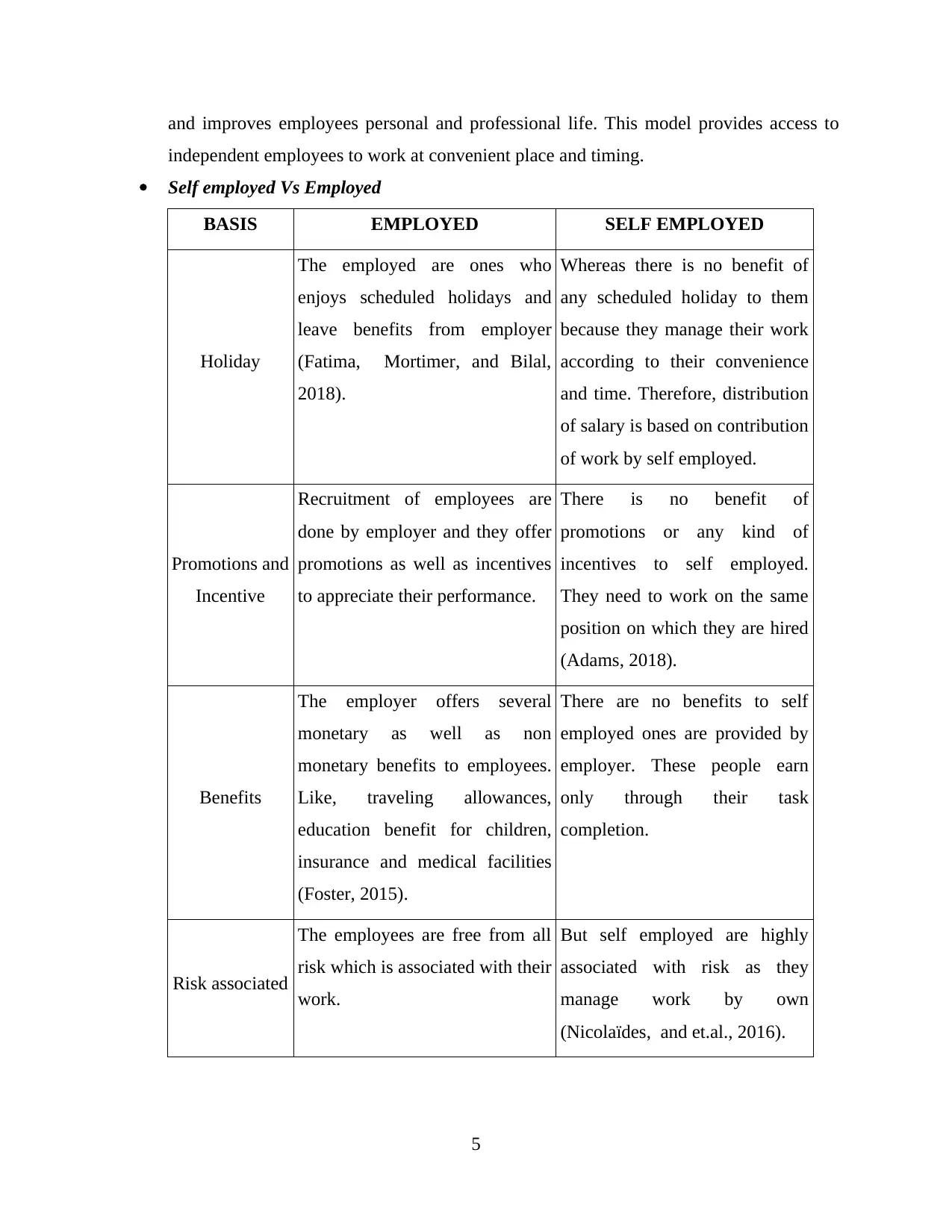
and improves employees personal and professional life. This model provides access to
independent employees to work at convenient place and timing.
Self employed Vs Employed
BASIS EMPLOYED SELF EMPLOYED
Holiday
The employed are ones who
enjoys scheduled holidays and
leave benefits from employer
(Fatima, Mortimer, and Bilal,
2018).
Whereas there is no benefit of
any scheduled holiday to them
because they manage their work
according to their convenience
and time. Therefore, distribution
of salary is based on contribution
of work by self employed.
Promotions and
Incentive
Recruitment of employees are
done by employer and they offer
promotions as well as incentives
to appreciate their performance.
There is no benefit of
promotions or any kind of
incentives to self employed.
They need to work on the same
position on which they are hired
(Adams, 2018).
Benefits
The employer offers several
monetary as well as non
monetary benefits to employees.
Like, traveling allowances,
education benefit for children,
insurance and medical facilities
(Foster, 2015).
There are no benefits to self
employed ones are provided by
employer. These people earn
only through their task
completion.
Risk associated
The employees are free from all
risk which is associated with their
work.
But self employed are highly
associated with risk as they
manage work by own
(Nicolaïdes, and et.al., 2016).
5
independent employees to work at convenient place and timing.
Self employed Vs Employed
BASIS EMPLOYED SELF EMPLOYED
Holiday
The employed are ones who
enjoys scheduled holidays and
leave benefits from employer
(Fatima, Mortimer, and Bilal,
2018).
Whereas there is no benefit of
any scheduled holiday to them
because they manage their work
according to their convenience
and time. Therefore, distribution
of salary is based on contribution
of work by self employed.
Promotions and
Incentive
Recruitment of employees are
done by employer and they offer
promotions as well as incentives
to appreciate their performance.
There is no benefit of
promotions or any kind of
incentives to self employed.
They need to work on the same
position on which they are hired
(Adams, 2018).
Benefits
The employer offers several
monetary as well as non
monetary benefits to employees.
Like, traveling allowances,
education benefit for children,
insurance and medical facilities
(Foster, 2015).
There are no benefits to self
employed ones are provided by
employer. These people earn
only through their task
completion.
Risk associated
The employees are free from all
risk which is associated with their
work.
But self employed are highly
associated with risk as they
manage work by own
(Nicolaïdes, and et.al., 2016).
5
Paraphrase This Document
Need a fresh take? Get an instant paraphrase of this document with our AI Paraphraser
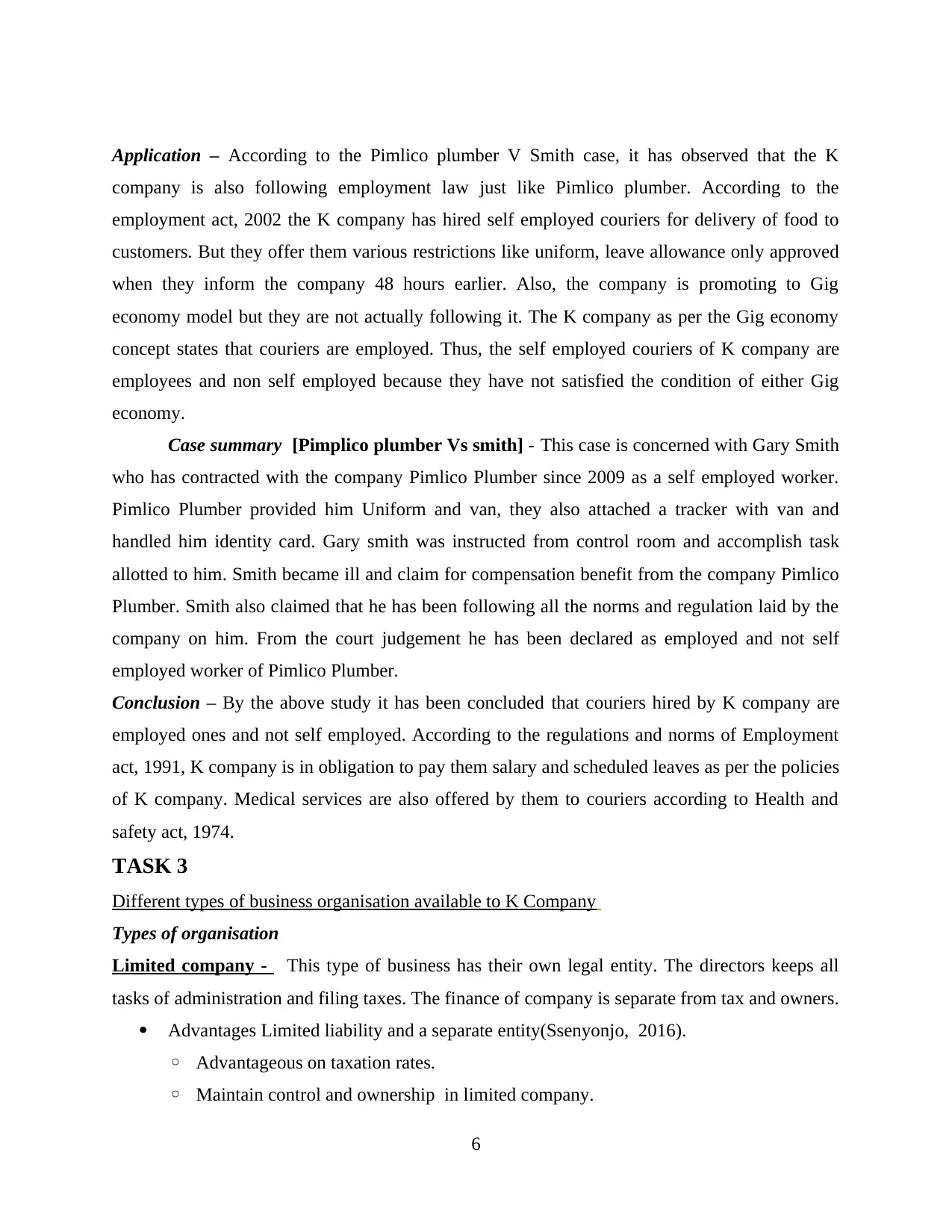
Application – According to the Pimlico plumber V Smith case, it has observed that the K
company is also following employment law just like Pimlico plumber. According to the
employment act, 2002 the K company has hired self employed couriers for delivery of food to
customers. But they offer them various restrictions like uniform, leave allowance only approved
when they inform the company 48 hours earlier. Also, the company is promoting to Gig
economy model but they are not actually following it. The K company as per the Gig economy
concept states that couriers are employed. Thus, the self employed couriers of K company are
employees and non self employed because they have not satisfied the condition of either Gig
economy.
Case summary [Pimplico plumber Vs smith] - This case is concerned with Gary Smith
who has contracted with the company Pimlico Plumber since 2009 as a self employed worker.
Pimlico Plumber provided him Uniform and van, they also attached a tracker with van and
handled him identity card. Gary smith was instructed from control room and accomplish task
allotted to him. Smith became ill and claim for compensation benefit from the company Pimlico
Plumber. Smith also claimed that he has been following all the norms and regulation laid by the
company on him. From the court judgement he has been declared as employed and not self
employed worker of Pimlico Plumber.
Conclusion – By the above study it has been concluded that couriers hired by K company are
employed ones and not self employed. According to the regulations and norms of Employment
act, 1991, K company is in obligation to pay them salary and scheduled leaves as per the policies
of K company. Medical services are also offered by them to couriers according to Health and
safety act, 1974.
TASK 3
Different types of business organisation available to K Company
Types of organisation
Limited company - This type of business has their own legal entity. The directors keeps all
tasks of administration and filing taxes. The finance of company is separate from tax and owners.
Advantages Limited liability and a separate entity(Ssenyonjo, 2016).
◦ Advantageous on taxation rates.
◦ Maintain control and ownership in limited company.
6
company is also following employment law just like Pimlico plumber. According to the
employment act, 2002 the K company has hired self employed couriers for delivery of food to
customers. But they offer them various restrictions like uniform, leave allowance only approved
when they inform the company 48 hours earlier. Also, the company is promoting to Gig
economy model but they are not actually following it. The K company as per the Gig economy
concept states that couriers are employed. Thus, the self employed couriers of K company are
employees and non self employed because they have not satisfied the condition of either Gig
economy.
Case summary [Pimplico plumber Vs smith] - This case is concerned with Gary Smith
who has contracted with the company Pimlico Plumber since 2009 as a self employed worker.
Pimlico Plumber provided him Uniform and van, they also attached a tracker with van and
handled him identity card. Gary smith was instructed from control room and accomplish task
allotted to him. Smith became ill and claim for compensation benefit from the company Pimlico
Plumber. Smith also claimed that he has been following all the norms and regulation laid by the
company on him. From the court judgement he has been declared as employed and not self
employed worker of Pimlico Plumber.
Conclusion – By the above study it has been concluded that couriers hired by K company are
employed ones and not self employed. According to the regulations and norms of Employment
act, 1991, K company is in obligation to pay them salary and scheduled leaves as per the policies
of K company. Medical services are also offered by them to couriers according to Health and
safety act, 1974.
TASK 3
Different types of business organisation available to K Company
Types of organisation
Limited company - This type of business has their own legal entity. The directors keeps all
tasks of administration and filing taxes. The finance of company is separate from tax and owners.
Advantages Limited liability and a separate entity(Ssenyonjo, 2016).
◦ Advantageous on taxation rates.
◦ Maintain control and ownership in limited company.
6
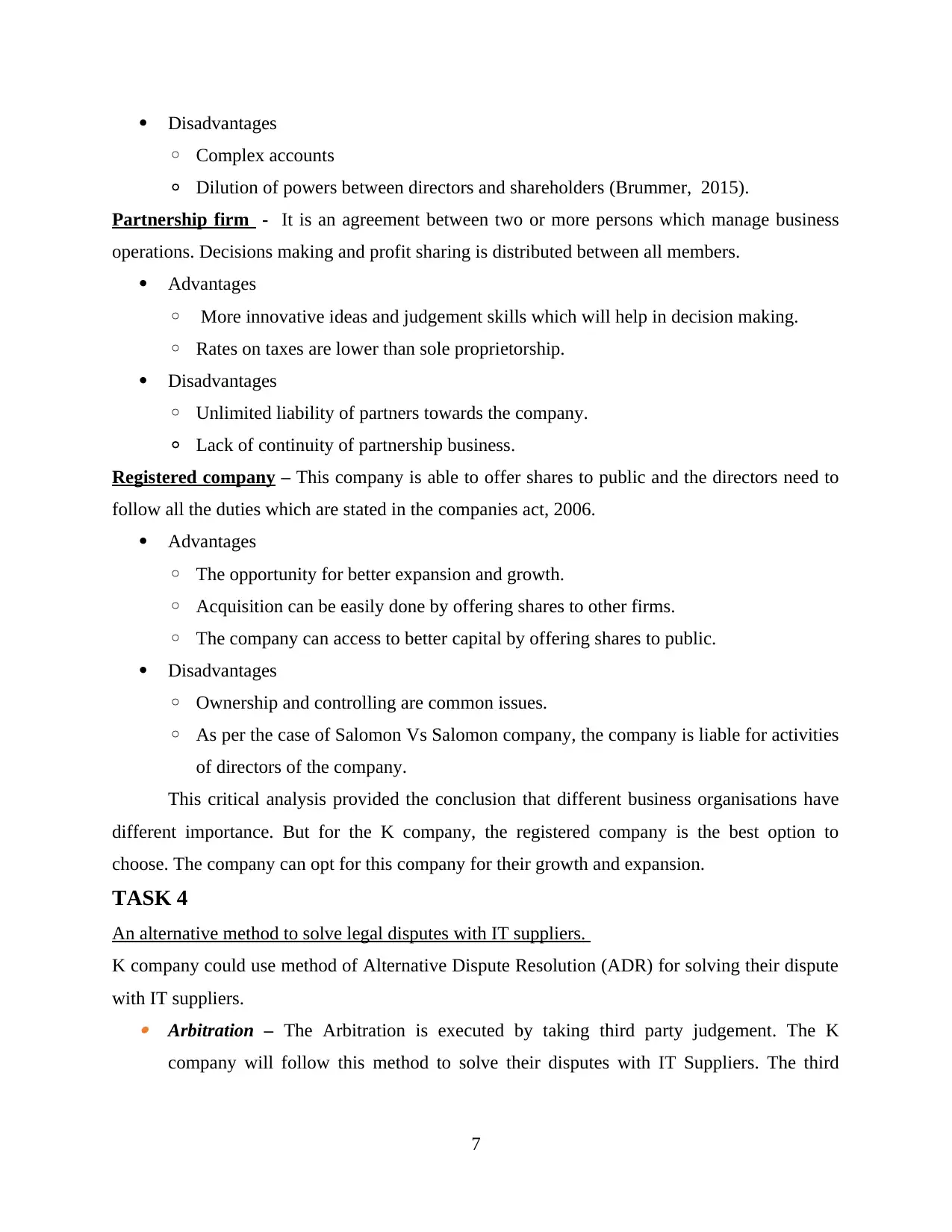
Disadvantages
◦ Complex accounts
◦ Dilution of powers between directors and shareholders (Brummer, 2015).
Partnership firm - It is an agreement between two or more persons which manage business
operations. Decisions making and profit sharing is distributed between all members.
Advantages
◦ More innovative ideas and judgement skills which will help in decision making.
◦ Rates on taxes are lower than sole proprietorship.
Disadvantages
◦ Unlimited liability of partners towards the company.
◦ Lack of continuity of partnership business.
Registered company – This company is able to offer shares to public and the directors need to
follow all the duties which are stated in the companies act, 2006.
Advantages
◦ The opportunity for better expansion and growth.
◦ Acquisition can be easily done by offering shares to other firms.
◦ The company can access to better capital by offering shares to public.
Disadvantages
◦ Ownership and controlling are common issues.
◦ As per the case of Salomon Vs Salomon company, the company is liable for activities
of directors of the company.
This critical analysis provided the conclusion that different business organisations have
different importance. But for the K company, the registered company is the best option to
choose. The company can opt for this company for their growth and expansion.
TASK 4
An alternative method to solve legal disputes with IT suppliers.
K company could use method of Alternative Dispute Resolution (ADR) for solving their dispute
with IT suppliers. Arbitration – The Arbitration is executed by taking third party judgement. The K
company will follow this method to solve their disputes with IT Suppliers. The third
7
◦ Complex accounts
◦ Dilution of powers between directors and shareholders (Brummer, 2015).
Partnership firm - It is an agreement between two or more persons which manage business
operations. Decisions making and profit sharing is distributed between all members.
Advantages
◦ More innovative ideas and judgement skills which will help in decision making.
◦ Rates on taxes are lower than sole proprietorship.
Disadvantages
◦ Unlimited liability of partners towards the company.
◦ Lack of continuity of partnership business.
Registered company – This company is able to offer shares to public and the directors need to
follow all the duties which are stated in the companies act, 2006.
Advantages
◦ The opportunity for better expansion and growth.
◦ Acquisition can be easily done by offering shares to other firms.
◦ The company can access to better capital by offering shares to public.
Disadvantages
◦ Ownership and controlling are common issues.
◦ As per the case of Salomon Vs Salomon company, the company is liable for activities
of directors of the company.
This critical analysis provided the conclusion that different business organisations have
different importance. But for the K company, the registered company is the best option to
choose. The company can opt for this company for their growth and expansion.
TASK 4
An alternative method to solve legal disputes with IT suppliers.
K company could use method of Alternative Dispute Resolution (ADR) for solving their dispute
with IT suppliers. Arbitration – The Arbitration is executed by taking third party judgement. The K
company will follow this method to solve their disputes with IT Suppliers. The third
7
⊘ This is a preview!⊘
Do you want full access?
Subscribe today to unlock all pages.

Trusted by 1+ million students worldwide
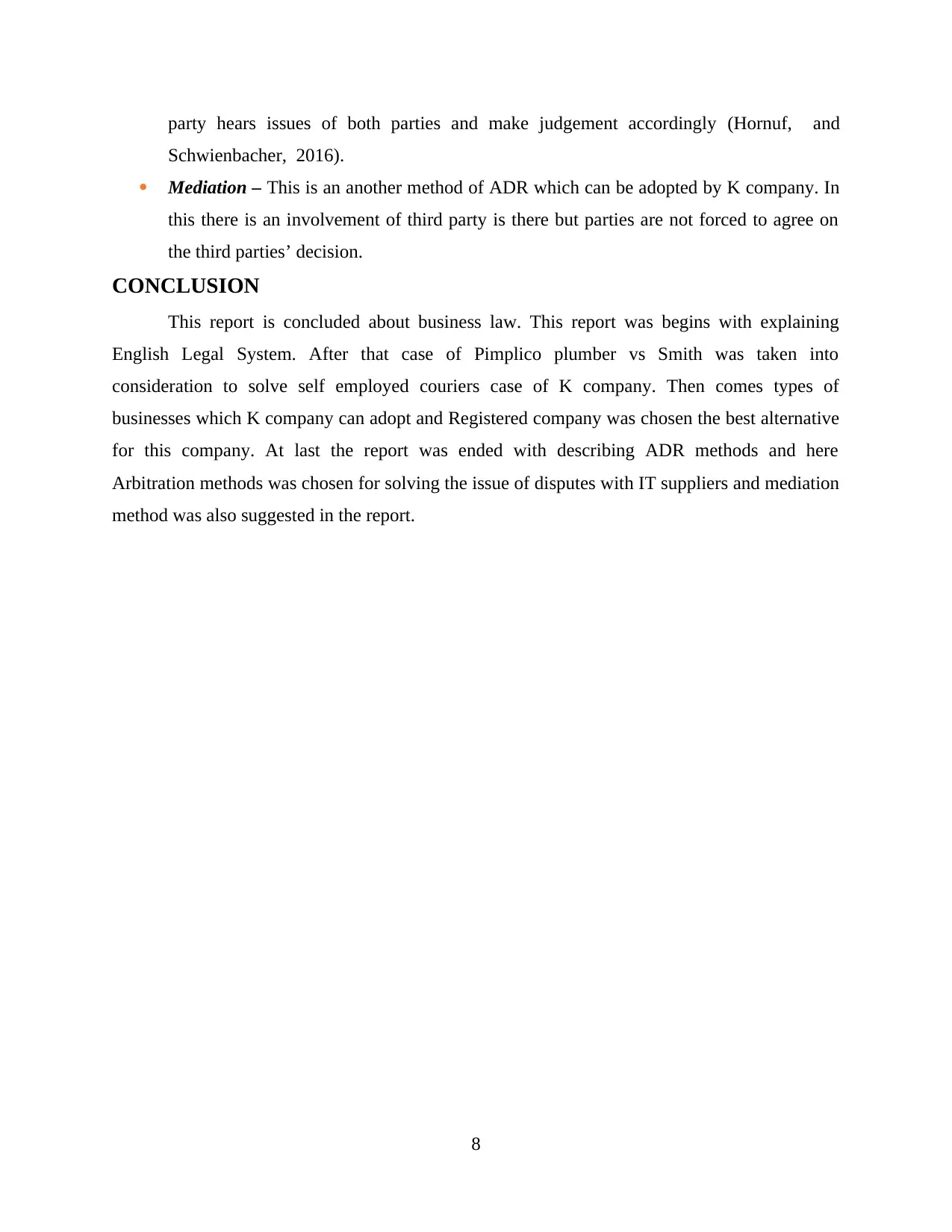
party hears issues of both parties and make judgement accordingly (Hornuf, and
Schwienbacher, 2016).
Mediation – This is an another method of ADR which can be adopted by K company. In
this there is an involvement of third party is there but parties are not forced to agree on
the third parties’ decision.
CONCLUSION
This report is concluded about business law. This report was begins with explaining
English Legal System. After that case of Pimplico plumber vs Smith was taken into
consideration to solve self employed couriers case of K company. Then comes types of
businesses which K company can adopt and Registered company was chosen the best alternative
for this company. At last the report was ended with describing ADR methods and here
Arbitration methods was chosen for solving the issue of disputes with IT suppliers and mediation
method was also suggested in the report.
8
Schwienbacher, 2016).
Mediation – This is an another method of ADR which can be adopted by K company. In
this there is an involvement of third party is there but parties are not forced to agree on
the third parties’ decision.
CONCLUSION
This report is concluded about business law. This report was begins with explaining
English Legal System. After that case of Pimplico plumber vs Smith was taken into
consideration to solve self employed couriers case of K company. Then comes types of
businesses which K company can adopt and Registered company was chosen the best alternative
for this company. At last the report was ended with describing ADR methods and here
Arbitration methods was chosen for solving the issue of disputes with IT suppliers and mediation
method was also suggested in the report.
8
Paraphrase This Document
Need a fresh take? Get an instant paraphrase of this document with our AI Paraphraser
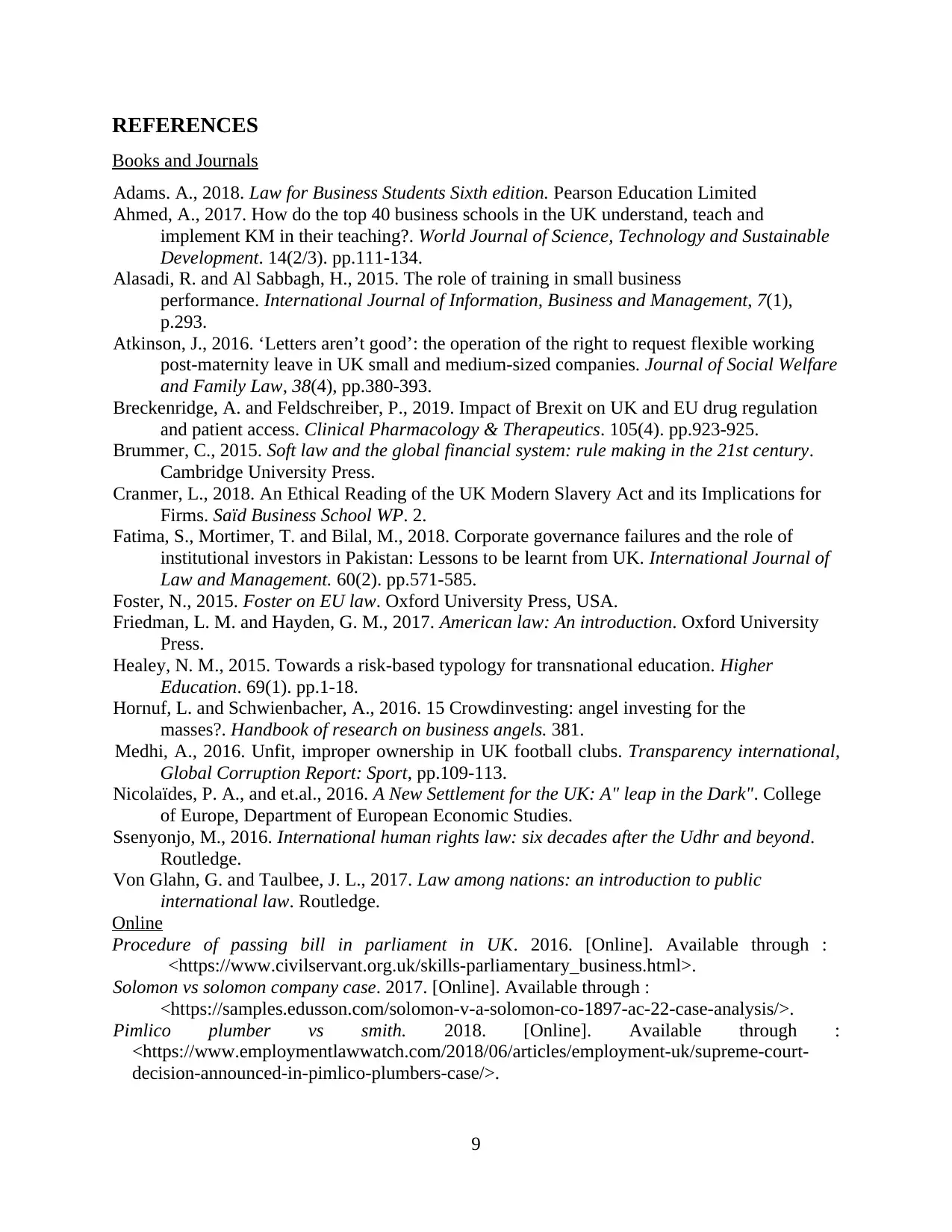
REFERENCES
Books and Journals
Adams. A., 2018. Law for Business Students Sixth edition. Pearson Education Limited
Ahmed, A., 2017. How do the top 40 business schools in the UK understand, teach and
implement KM in their teaching?. World Journal of Science, Technology and Sustainable
Development. 14(2/3). pp.111-134.
Alasadi, R. and Al Sabbagh, H., 2015. The role of training in small business
performance. International Journal of Information, Business and Management, 7(1),
p.293.
Atkinson, J., 2016. ‘Letters aren’t good’: the operation of the right to request flexible working
post-maternity leave in UK small and medium-sized companies. Journal of Social Welfare
and Family Law, 38(4), pp.380-393.
Breckenridge, A. and Feldschreiber, P., 2019. Impact of Brexit on UK and EU drug regulation
and patient access. Clinical Pharmacology & Therapeutics. 105(4). pp.923-925.
Brummer, C., 2015. Soft law and the global financial system: rule making in the 21st century.
Cambridge University Press.
Cranmer, L., 2018. An Ethical Reading of the UK Modern Slavery Act and its Implications for
Firms. Saïd Business School WP. 2.
Fatima, S., Mortimer, T. and Bilal, M., 2018. Corporate governance failures and the role of
institutional investors in Pakistan: Lessons to be learnt from UK. International Journal of
Law and Management. 60(2). pp.571-585.
Foster, N., 2015. Foster on EU law. Oxford University Press, USA.
Friedman, L. M. and Hayden, G. M., 2017. American law: An introduction. Oxford University
Press.
Healey, N. M., 2015. Towards a risk-based typology for transnational education. Higher
Education. 69(1). pp.1-18.
Hornuf, L. and Schwienbacher, A., 2016. 15 Crowdinvesting: angel investing for the
masses?. Handbook of research on business angels. 381.
Medhi, A., 2016. Unfit, improper ownership in UK football clubs. Transparency international,
Global Corruption Report: Sport, pp.109-113.
Nicolaïdes, P. A., and et.al., 2016. A New Settlement for the UK: A" leap in the Dark". College
of Europe, Department of European Economic Studies.
Ssenyonjo, M., 2016. International human rights law: six decades after the Udhr and beyond.
Routledge.
Von Glahn, G. and Taulbee, J. L., 2017. Law among nations: an introduction to public
international law. Routledge.
Online
Procedure of passing bill in parliament in UK. 2016. [Online]. Available through :
<https://www.civilservant.org.uk/skills-parliamentary_business.html>.
Solomon vs solomon company case. 2017. [Online]. Available through :
<https://samples.edusson.com/solomon-v-a-solomon-co-1897-ac-22-case-analysis/>.
Pimlico plumber vs smith. 2018. [Online]. Available through :
<https://www.employmentlawwatch.com/2018/06/articles/employment-uk/supreme-court-
decision-announced-in-pimlico-plumbers-case/>.
9
Books and Journals
Adams. A., 2018. Law for Business Students Sixth edition. Pearson Education Limited
Ahmed, A., 2017. How do the top 40 business schools in the UK understand, teach and
implement KM in their teaching?. World Journal of Science, Technology and Sustainable
Development. 14(2/3). pp.111-134.
Alasadi, R. and Al Sabbagh, H., 2015. The role of training in small business
performance. International Journal of Information, Business and Management, 7(1),
p.293.
Atkinson, J., 2016. ‘Letters aren’t good’: the operation of the right to request flexible working
post-maternity leave in UK small and medium-sized companies. Journal of Social Welfare
and Family Law, 38(4), pp.380-393.
Breckenridge, A. and Feldschreiber, P., 2019. Impact of Brexit on UK and EU drug regulation
and patient access. Clinical Pharmacology & Therapeutics. 105(4). pp.923-925.
Brummer, C., 2015. Soft law and the global financial system: rule making in the 21st century.
Cambridge University Press.
Cranmer, L., 2018. An Ethical Reading of the UK Modern Slavery Act and its Implications for
Firms. Saïd Business School WP. 2.
Fatima, S., Mortimer, T. and Bilal, M., 2018. Corporate governance failures and the role of
institutional investors in Pakistan: Lessons to be learnt from UK. International Journal of
Law and Management. 60(2). pp.571-585.
Foster, N., 2015. Foster on EU law. Oxford University Press, USA.
Friedman, L. M. and Hayden, G. M., 2017. American law: An introduction. Oxford University
Press.
Healey, N. M., 2015. Towards a risk-based typology for transnational education. Higher
Education. 69(1). pp.1-18.
Hornuf, L. and Schwienbacher, A., 2016. 15 Crowdinvesting: angel investing for the
masses?. Handbook of research on business angels. 381.
Medhi, A., 2016. Unfit, improper ownership in UK football clubs. Transparency international,
Global Corruption Report: Sport, pp.109-113.
Nicolaïdes, P. A., and et.al., 2016. A New Settlement for the UK: A" leap in the Dark". College
of Europe, Department of European Economic Studies.
Ssenyonjo, M., 2016. International human rights law: six decades after the Udhr and beyond.
Routledge.
Von Glahn, G. and Taulbee, J. L., 2017. Law among nations: an introduction to public
international law. Routledge.
Online
Procedure of passing bill in parliament in UK. 2016. [Online]. Available through :
<https://www.civilservant.org.uk/skills-parliamentary_business.html>.
Solomon vs solomon company case. 2017. [Online]. Available through :
<https://samples.edusson.com/solomon-v-a-solomon-co-1897-ac-22-case-analysis/>.
Pimlico plumber vs smith. 2018. [Online]. Available through :
<https://www.employmentlawwatch.com/2018/06/articles/employment-uk/supreme-court-
decision-announced-in-pimlico-plumbers-case/>.
9
1 out of 11
Related Documents
Your All-in-One AI-Powered Toolkit for Academic Success.
+13062052269
info@desklib.com
Available 24*7 on WhatsApp / Email
![[object Object]](/_next/static/media/star-bottom.7253800d.svg)
Unlock your academic potential
Copyright © 2020–2025 A2Z Services. All Rights Reserved. Developed and managed by ZUCOL.





